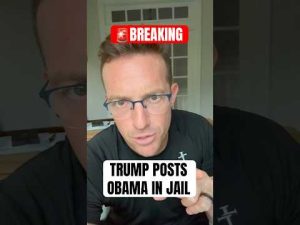In a surprising twist, new information has emerged, suggesting that the Obama administration may have manipulated intelligence related to Russian interference in the 2016 election. This revelation unfolds like a plot twist in a political thriller, one that has been stirring the pot among conservatives since the election. It seems as though, just when we thought we knew the whole story, a new chapter has been written that could turn the narrative on its head.
The drama began to unfold back in August of 2016 when James Clapper, the former Director of National Intelligence, stated that there was no evidence of a Russian threat to manipulate the election results. Fast forward a few days later and the FBI, shaking in its boots, suggested it felt “uncomfortable,” hinting at the possibility of Russian disruptions. But this wasn’t the beginning of a clear tale. In early September, assessments emanated from the intelligence community suggesting that Russia was unlikely to engage in election interference through cyber means. How perplexing it must have been for everyone involved — dancing between assurances of safety and the ominous undertones of foreign meddling.
Then, in an ironic plot twist reminiscent of a soap opera, everything shifted after a significant meeting in the White House Situation Room. Key officials from the Obama administration convened, and it was here that the direction clearly changed. An email went out from Clapper’s office, tasking the CIA, FBI, NSA, and DHS with creating an assessment on how Russia was trying to influence the election. Suddenly, what had once been dismissed as benign chatter transformed into a full-blown narrative that would set the stage for years of speculation, investigation, and media frenzy.
For many conservatives, including those on networks such as Newsmax, this new information felt like déjà vu. Was it no longer a surprise to recognize the deep distrust that has brewed towards mainstream media and establishment narratives? As one commentator reflected, the legacy media ran with the story of Russian interference as if it were carved in stone. The implications of this manipulation could mean a significant blow to the credibility of those institutions, opening doors for alternative viewpoints to flourish, as folks become increasingly skeptical of official statements.
Meanwhile, some still cling to the idea that Russia’s attempts to meddle in U.S. voting practices are a well-established fact. From funding think tanks and media outlets to the infamous DNC hacks, it seems Russians always find a way to stir the waters. Yet, as the new revelations shed light on how intelligence was handled, the returns of trust in the institutions tasked with keeping elections secure grows slim — leading many to search for truth beyond the headlines.
The narrative surrounding the 2016 election is far from over; it continues to evolve with twists and turns that could rival a Hollywood blockbuster. As details unfold, one thing remains clear: the relationship between the electorate, political narratives, and the truth is more complicated and contentious than ever before. As conservatives dig deeper, they’re reminded once again to question, to probe, and to seek out alternative narratives, crafting their own understanding of what really happened during that tumultuous election season.







